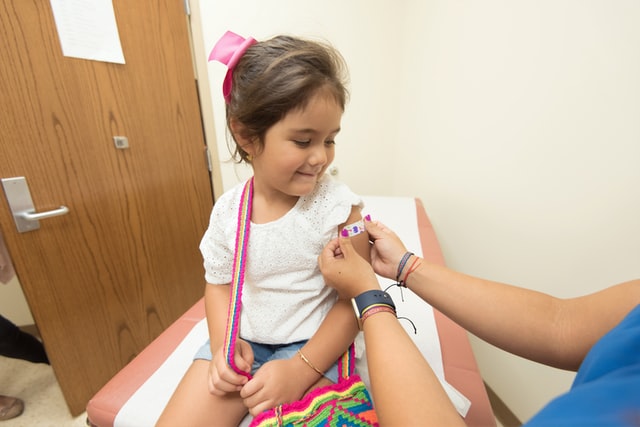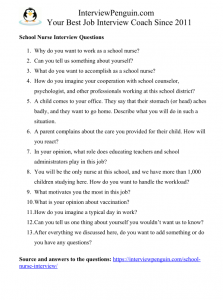Children experience a lot of issues at schools–mental, physical, emotional. It’s great to know that there’s always a nurse they can visit, each day, all day long, someone who can treat their wounds, but also listen to their concerns, and refer them to other healthcare professionals, or send them home when they have fever or feel bad.
Nursing is not an easy job, especially when you are the only nurse at school with 1,000 children–which is the reality at many school all around the globe. But it’s a rewarding role, one that can give your days a meaningful purpose.
What’s more, since you will also treat and educate staff members (for example how they can successfully manage a child with chronic condition or special healthcare needs), you can have a huge positive impact on individual lives of both students and teachers.
To sum it up, you made a brave but good career choice. Let’s have a look at some questions you may face while interviewing for this position.
Table of Contents
Why do you want to work as a school nurse?
You can refer to several reasons. One is the impact you can have in this position. Say them that you understand the crucial role a school nurse plays at each educational institution–bridging healthcare and education, working as a case manager, and often the only one at school.
It’s a huge responsibility but also an opportunity to make the school a better place for everyone, and especially for children who suffer from chronic condition or some severe problems. You were always looking for a job with a meaningful purpose, and you found your calling in the job of a school nurse.
Another alternative is saying that you’ve always felt close to children (or even to a particular grade level, for example when you apply at elementary school). What’s more, you consider yourself a decent educator, and believe that you’ll be able not only to treat the wounds, but also to help teachers with your guidance regarding management of children who experience different health issues.
Not many jobs combine the role of a healthcare provider and educator. This one does. And since you have the skills and passion for the job, you decided to apply for a position of a school nurse.
* May also interest you: 7 sample answers to “Why nursing?”
Can you tell us something about yourself?
You can face two different scenarios at this point. The first one is when you already have some nursing experience–from a hospital, clinic, prison, any other setting.
If that’s the case, you should focus mostly on your working experience. Tell them what you did, how your typical day in work looked like, what sort of injuries and problems you helped to treat, and so on. If you educated anyone in your former jobs, you should definitely mention it (to bridge your experience with the duties you’ll have in your new job).
Second scenario is when you have no experience. In this case, you should focus more on your values, goals, your vision of the future. Tell them who you are, where you studied, and what direction you’d like to pursue in your professional career. You can mention values such as integrity, attention to detail, personal approach to each patient/client, and so on.
Remember that in this case, your non-verbal communication is more important than your words. Can they hear some enthusiasm in your voice? Is there any energy in you? Can they feel the passion you have for nursing?
That’s the most important thing for them to see and feel, especially if you have no previous experience. Keep it on your mind.
What do you want to accomplish as a school nurse?
Try to show a holistic approach to your role at school. You can say, for example, that you’d like to improve the level of prevention and screening at school, to address any problems early, before they turn into something bigger.
You can also say that your main goal is to ensure that each child, as well as each staff member, feels more secure at school, because they know where your office is, and that you are always there to hear them out, and to help them with any concerns related to their health, whether physical or mental.
It’s good to have such a thought somewhere in the back of your head, that there is someone I can rely on, a good and empathetic nurse, ready to hear me out…
Alternatively you can focus more on the educative part of your job, the way you want to help teachers to work more effectively with children who experience certain health issues, or to educate children on prevention of communicable diseases and other issues.
One way or another, the interviewers should get an impression that you want to accomplish something in your job, that you have some vision, and want to make their school a better place.
Special Tip: Download all questions in a one page long PDF, and practice your interview answers anytime later:
How do you imagine your cooperation with school counselor, psychologist, and other professionals working at this school district?
You are not allowed to diagnose illnesses or mental health issues while working as a school nurse. You can make a suggestion, but you should always send the child to a certified professional who will make the final diagnosis (or they won’t make any).
More than anything else, you will serve as a case manager, ensuring that the children are heard out and treated in the most optimal way, whether at school or outside of it. This is what you should focus on anytime they ask you about your cooperation with counselors, parents, doctors, anyone else.
Ensure them that you understand your role and will try to build a good relationship with all other healthcare professionals in the district. You want to work as a liaison between school children and all other professionals, helping with the effective communication, and making sure that the child receives the care and treatment they need.
* May also interest you: Nursing interview – Why should we hire you?
A child comes to your office. They say that their stomach (or head) aches badly, and they want to go home. Describe what you will do in such a situation.
Once again, you should try to demonstrate a holistic approach to your role. You won’t send them home just like that, because if you did so, you might soon have twenty children in your office each morning, asking you to send them home. They would take advantage of your good nature…
Say that you will consider each case individually. You want to know your students, and plan to keep records of all visits.
So if the child in question was in your office two weeks ago, complaining about the same problem but never visiting a physician afterwards, and, “accidentally”, they have a math test today, just like they had two weeks ago when you sent them home, you’ll consider their case with caution, and perhaps you’ll refer them to a school psychologist. Headache or stomachache likely isn’t their real problem…
Say that you will question each child about the symptoms, and try to find out whether they are telling you the truth. Of course you will measure their temperature and do all other things. You may also consult some professionals at school, call their teacher or perhaps even their parents. Basically you’ll do everything you can do assess whether you should send them home or not.
A parent complains about the care you provided for their child. How will you react?
Ensure the hiring committee that you will take each feedback seriously. You believe to be a good nurse, but you are a human being, and you can make a mistake–just like anyone else. Showing some humility in an interview can only help you…
You will patiently listen to the parent, let them finish their speech, and, without showing any negative emotions, you’ll either apologize (when, after hearing their words, you realize that you made a mistake), or present them your point of view, how you see the entire situation (if you think that their child didn’t tell them the entire truth).
In any case, you will learn your lesson. Say the interviewers that you embrace each constructive criticism (or any criticism), since it helps you to become better in your job, or at least to communicate things in a more appropriate way.
Other questions you may face in your interview for a job of a school nurse
- In your opinion, what role does educating teachers and school administrators play in this job?
- You will be the only nurse at this school, and we have more than 1,000 children studying here. How do you want to handle the workload?
- What motivates you the most in this job?
- What is your opinion about vaccination?
- How do you imagine a typical day in work?
- Can you tell us one thing about yourself you wouldn’t want us to know?
- After everything we discussed here, do you want to add something or do you have any questions?
Conclusion, next steps
It’s true that school nurses are in demand, but it is also true that this career path is popular among nursing graduates, and you will typically compete with many other people for the job. It makes your situation more difficult.
Try to do as much as you can to prepare for your interview. Do a good research about your future place of work, and try to prepare a short answer to each question I outlined in this article. Last but not least, remember that your non-verbal communication matters as much as your words.
Show enthusiasm for the work, some passion for the great things you want to achieve at their school. It can win you the favor of your interviewers, and a new employment contract. And if you would like to get some extra help, and learn something your competitors won’t know in the interviews, check out one of my eBooks, the Pediatric Nurse Interview Guide. Premium answers to 25 most common pediatric nursing interview questions (majority of them overlaps with questions for a school nurse) will help you stand out, and get the job. Thank you for checking out the eBook, and I wish you good luck!
Matthew
May also interest you:
- Nursing interview questions – List of question you may face while interviewing for any nursing job.
- Correctional Nurse interview questions.
- Labor and Delivery Nurse interview questions.


